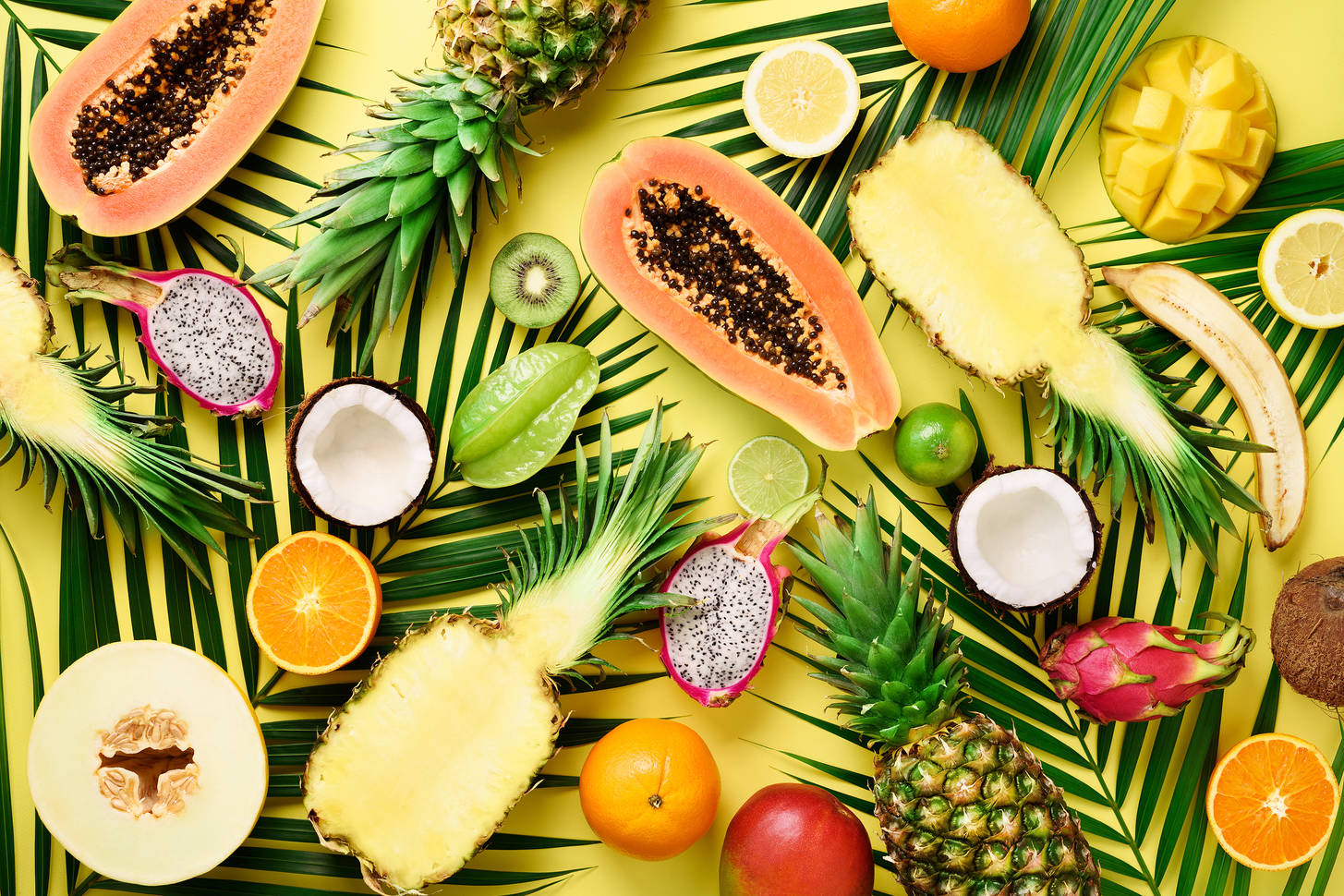Tropical fruits are not only delicious but also packed with essential vitamins, especially vitamin C. This nutrient is crucial for maintaining a healthy immune system, promoting skin health, and aiding in the absorption of iron from plant-based foods. In this comprehensive guide, we will explore how to maximize your intake of vitamin C from tropical fruits. We’ll delve into the benefits, the best sources, and practical tips for incorporating these fruits into your diet.
Understanding Vitamin C
Vitamin C, also known as ascorbic acid, is a water-soluble vitamin found in various foods, particularly fruits and vegetables. It plays several vital roles in the body, including:
- Immune Support: Vitamin C enhances the immune system by supporting various cellular functions of both the innate and adaptive immune systems.
- Antioxidant Properties: It acts as an antioxidant, protecting cells from damage by free radicals.
- Collagen Synthesis: Vitamin C is essential for the biosynthesis of collagen, a protein that helps in wound healing and maintains the health of skin, cartilage, and bones.
- Iron Absorption: It enhances the absorption of non-heme iron, the type of iron present in plant-based foods.
The Best Tropical Fruits for Vitamin C
Oranges
Oranges are perhaps the most well-known source of vitamin C. A single medium-sized orange provides about 70 mg of vitamin C, which is more than the daily recommended intake for most adults.
Guavas
Guavas are one of the richest sources of vitamin C, with a single fruit providing over 200 mg. This tropical fruit is not only high in vitamin C but also packed with dietary fiber and other antioxidants.
Papayas
Papayas are another excellent source of vitamin C, with one cup of papaya providing around 88 mg of the vitamin. They are also rich in vitamin A, folate, and fiber.
Pineapples
Pineapples are a delicious tropical fruit that offers about 79 mg of vitamin C per cup. They are also a good source of manganese and bromelain, an enzyme that may help with digestion.
Mangoes
Mangoes, often referred to as the “king of fruits,” provide about 60 mg of vitamin C per cup. They are also high in vitamin A and dietary fiber.
Kiwifruits
While not exclusively tropical, kiwifruits are often included in the tropical fruit category due to their high vitamin C content. One medium kiwifruit contains about 71 mg of vitamin C.
Tips to Maximize Vitamin C Intake from Tropical Fruits
Choose Fresh Over Processed
Fresh fruits generally have higher vitamin C content than processed or canned fruits. Processing can lead to a significant loss of vitamin C due to heat and prolonged storage.
Eat Them Raw
Vitamin C is sensitive to heat, so consuming tropical fruits raw is the best way to preserve their vitamin C content. Cooking can reduce the vitamin C levels in fruits.
Store Them Properly
Vitamin C degrades over time, especially when fruits are exposed to light, heat, and air. Store your tropical fruits in a cool, dark place or in the refrigerator to maintain their vitamin C levels.
Incorporate a Variety
Different tropical fruits have varying amounts of vitamin C, so including a variety in your diet can help you get a more balanced intake of this vital nutrient.
Pair with Iron-Rich Foods
Since vitamin C enhances the absorption of iron, pairing tropical fruits with iron-rich foods can boost your overall nutrient intake. For example, add slices of mango to a spinach salad or enjoy a glass of orange juice with your iron-fortified breakfast cereal.
Make Smoothies
Smoothies are a convenient and delicious way to consume multiple tropical fruits at once, ensuring a high intake of vitamin C. Combine fruits like mangoes, papayas, and oranges for a vitamin C-packed drink.
Use as Toppings
Add tropical fruits as toppings to your yogurt, oatmeal, or cereal to increase your vitamin C intake. This also adds a burst of flavor and color to your meals.
Drink Fresh Juices
Freshly squeezed fruit juices are another excellent way to consume vitamin C. Make sure to drink them immediately after preparation to avoid loss of vitamin C due to oxidation.
Include in Salads
Tropical fruits can be a delightful addition to salads. Combine them with leafy greens and nuts for a nutritious and refreshing meal.
Avoid Overripe Fruits
Overripe fruits tend to have lower vitamin C content. Consume fruits when they are ripe but not overly so to get the maximum nutrient benefit.
FAQs About Vitamin C and Tropical Fruits
What are the best tropical fruits for vitamin C?
Oranges, guavas, papayas, pineapples, mangoes, and kiwifruits are among the best tropical fruits for vitamin C. They provide substantial amounts of this essential nutrient.
How does vitamin C benefit the immune system?
Vitamin C supports the immune system by promoting the production and function of white blood cells, enhancing the skin’s barrier function, and acting as an antioxidant to protect immune cells from oxidative damage.
Can I get enough vitamin C from tropical fruits alone?
Yes, incorporating a variety of tropical fruits into your diet can provide enough vitamin C to meet your daily requirements. For example, consuming a combination of oranges, guavas, and papayas can easily fulfill your vitamin C needs.
How does cooking affect the vitamin C content in fruits?
Cooking can significantly reduce the vitamin C content in fruits due to its sensitivity to heat. To maximize vitamin C intake, it’s best to consume fruits raw or use cooking methods that preserve their nutrient content, such as steaming or microwaving.
Are there any side effects of consuming too much vitamin C?
While vitamin C is generally safe, excessive intake (usually from supplements) can lead to side effects like diarrhea, nausea, and stomach cramps. It’s best to get vitamin C from natural food sources and stick to the recommended daily intake.
How can I incorporate more tropical fruits into my diet?
You can incorporate more tropical fruits into your diet by adding them to smoothies, salads, yogurt, oatmeal, and cereals. You can also enjoy them as snacks or make fresh juices for a vitamin C boost.
Is vitamin C from supplements as effective as from fruits?
Vitamin C from supplements can be effective, but getting it from natural food sources like tropical fruits provides additional benefits such as fiber, other vitamins, and antioxidants. Whole fruits offer a more balanced and nutrient-dense option.
How should I store tropical fruits to preserve their vitamin C content?
Store tropical fruits in a cool, dark place or in the refrigerator to preserve their vitamin C content. Avoid exposing them to light, heat, and air, which can degrade vitamin C.
Can vitamin C help with skin health?
Yes, vitamin C is crucial for collagen synthesis, which helps maintain skin elasticity and firmness. It also acts as an antioxidant, protecting the skin from damage caused by free radicals and UV exposure.
What is the daily recommended intake of vitamin C?
The daily recommended intake of vitamin C varies by age and gender. For most adults, it is 90 mg for men and 75 mg for women. Pregnant and breastfeeding women, smokers, and individuals with certain medical conditions may require higher amounts.
Conclusion
Getting more vitamin C from tropical fruits is not only beneficial for your health but also a delicious and enjoyable way to meet your nutritional needs. By choosing a variety of fresh, raw fruits and incorporating them into your meals in creative ways, you can ensure a sufficient intake of this vital nutrient. Remember to store fruits properly and avoid overcooking to preserve their vitamin C content. With these tips and insights, you can make the most of the tropical bounty and support your overall well-being.
- Clout Chasing In Love: When Social Status Becomes A Priority - May 8, 2025
- Jalupro Super Hydro Skin Booster Treatments Near Buckland, Surrey - May 6, 2025
- How To Fix Marionette Lines Without Fillers? - May 5, 2025

